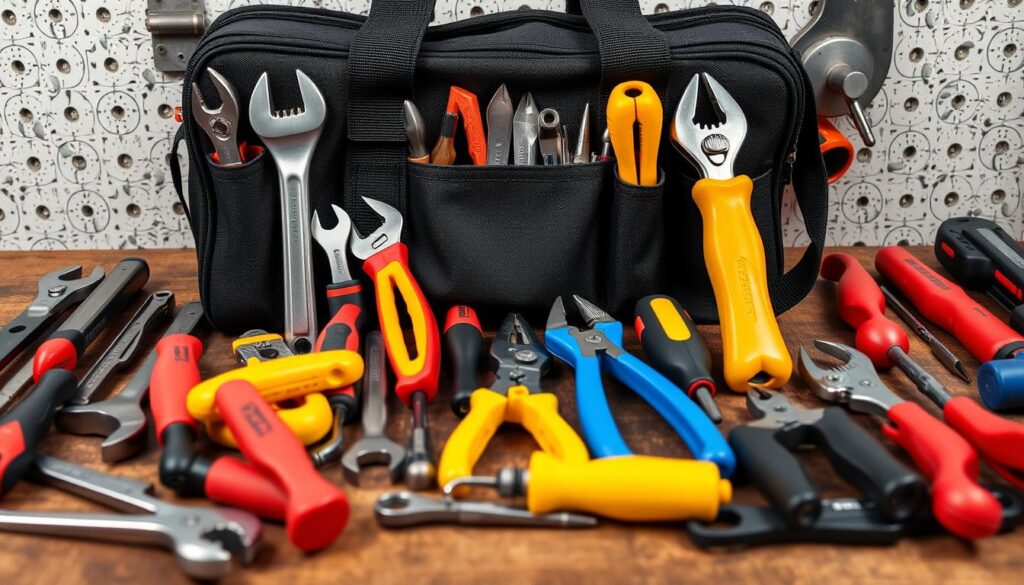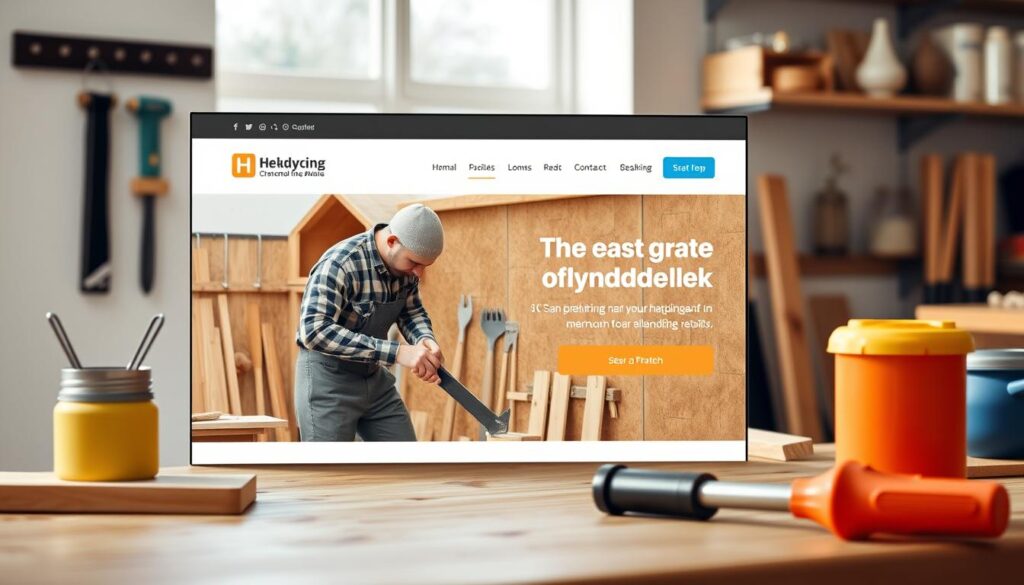Are you the go-to person for odd jobs around the house? Do you have a knack for fixing things and making improvements? If so, you’re not alone. Many individuals in the UK possess practical skills that could be turned into a successful handyman business.
The demand for reliable home repair services is on the rise, driven by homeowners seeking to maintain and enhance their properties. By leveraging your skills, you can capitalise on this trend and establish a thriving business with flexibility and potential for growth.
Key Takeaways
- Identify your niche within the home repair market.
- Understand the essential skills and qualifications required.
- Learn about the legal requirements for operating a handyman business.
- Discover effective marketing strategies to attract clients.
- Explore the tools and equipment needed to deliver quality services.
Is a Home Repair Business Right for You?
Before diving into the world of home repair business, it’s essential to assess whether this venture aligns with your personal and professional goals. Running a successful business requires a blend of technical skills, business acumen, and personal qualities that enable you to navigate the challenges of entrepreneurship.
Essential Personal Qualities
To succeed as a home repair business owner, you need to possess certain personal qualities. Being a self-starter is crucial, as you’ll be in charge and responsible for making critical decisions and completing tasks without external motivation. You should also be comfortable with variable income and managing your own schedule, which requires discipline and organizational skills.
Self-Assessment Questions
To determine if a home repair business is right for you, consider the following questions: Are you technically skilled and willing to continuously learn new skills? Do you have experience with home repairs, and are you comfortable interacting with clients? Are you prepared to handle the physical demands of the job and manage your time effectively? Reflecting on these aspects will help you make an informed decision about your suitability for running a home repair business.
Evaluating your business skills and personal preferences is vital. Ask yourself if you’re comfortable with tasks such as marketing, accounting, and customer service, which are essential for the success of your business. By honestly assessing your strengths and weaknesses, you can determine if starting a home repair business is a viable option for you.
Essential Skills for a Successful Home Repair Business
To succeed in the home repair business, you need a diverse set of skills. Running a home repair business involves not only technical proficiency but also strong business acumen and excellent customer service skills.
Core Technical Skills
As a home repair business owner, you’ll be required to perform a variety of physical tasks, from plumbing and electrical work to carpentry and general maintenance. Developing problem-solving skills is crucial to handle unexpected issues that may arise during a job. You should be comfortable working with different tools and equipment, and be able to diagnose and fix problems efficiently.
Here is a summary of the key technical skills required:
| Technical Skill | Description | Importance Level |
|---|---|---|
| Plumbing | Fixing leaks, unclogging drains | High |
| Electrical Work | Installing fixtures, repairing wiring | High |
| Carpentry | Building, repairing structures | Medium |

Business and Customer Service Skills
In addition to technical skills, you’ll need to manage your business effectively. This includes time management, basic accounting, and scheduling. Providing excellent customer service is also vital, as it can lead to repeat business and referrals. You should be able to communicate effectively with clients, understand their needs, and provide accurate estimates for your services.
Some key business and customer service skills include:
- Effective communication with clients
- Professionalism in all client interactions
- Accurate estimation skills when quoting jobs
- Time management and scheduling
Qualifications and Training Options
Qualifications and training are vital components in setting up a successful home repair business, ensuring you have the necessary skills and knowledge.
Relevant NVQ and City & Guilds Courses
To enhance your credibility and skills, consider enrolling in NVQ (National Vocational Qualification) or City & Guilds courses. These qualifications cover various aspects of home maintenance and repair, ensuring you’re well-versed in the latest practices. For instance, NVQ Level 2 in Construction Operations or City & Guilds Level 2 Diploma in Plumbing are highly regarded in the industry.
Benefits of Professional Certification
Professional certifications can significantly differentiate your business from competitors, justifying higher rates and attracting more discerning clients. By obtaining recognized qualifications, you demonstrate your commitment to services excellence and adherence to current building regulations and safety standards.
- Enhanced credibility: Certifications can help secure contracts with letting agencies and property management companies.
- Compliance: Formal training ensures you’re up to date with the latest maintenance practices and safety standards.
- Insurance benefits: Holding recognized qualifications may lead to discounts on insurance premiums.
By investing in professional certifications, you not only boost your business reputation but also potentially increase your earning potential. This strategic investment in your skills and qualifications can lead to a more successful and sustainable home repair business.
Starting a Home Repair Business: What to Know About Legal Requirements
Launching a home repair business in the UK requires a thorough understanding of the legal obligations involved. As you prepare to start your business, you need to consider several legal aspects to ensure compliance with UK laws and regulations.
Business Structure Options in the UK
Choosing the right business structure is a critical decision that affects your business’s legal and tax obligations. You have several options, including being a sole trader, forming a partnership, or registering as a limited company. Each structure has its advantages and disadvantages. For instance, being a sole trader is straightforward and involves less paperwork, but it also means you’ll have unlimited personal liability. On the other hand, registering as a limited company provides liability protection but involves more complex administrative tasks.
When deciding on a business structure, consider factors such as the size of your business, your personal liability comfort level, and your tax obligations. It’s also worth consulting with an accountant or business advisor to determine the most suitable structure for your home repair business.
Registration and Tax Obligations
Once you’ve chosen your business structure, you’ll need to register with the relevant authorities and comply with tax obligations. If you’re operating as a sole trader, you’ll need to register as self-employed with HMRC. This involves notifying HMRC within three months of starting your business to avoid penalties.
- Register as self-employed with HMRC and complete a Self Assessment tax return annually.
- Understand VAT registration requirements; you must register if your annual turnover exceeds the VAT threshold (currently £85,000).
- Keep accurate records of your business income and expenses to simplify your tax return and claim allowable expenses.
- Claim tax deductions on business expenses such as tools, vehicle expenses, and other costs related to your home repair business.
It’s essential to stay on top of your tax obligations to avoid any potential issues with HMRC. Consider seeking professional advice to ensure you’re meeting all the necessary requirements and taking advantage of available tax deductions.
Essential Tools and Equipment
As you embark on your journey to start a home repair business, it’s crucial to assemble the right tools and equipment. You might own some of these already, but be sure to test any items you have and consider if any of them need upgrading.
Basic Tool Kit Essentials

For a professional handyman tool kit in the UK, you’ll need a comprehensive set of basic tools. This includes a hammer, tape measure, level, pliers, screwdrivers, and a utility knife. Investing in high-quality tools will reduce maintenance costs in the long run.
Vehicle and Storage Considerations
For a mobile home repair business, you’ll need a reliable vehicle. Consider whether a van or a car with a roof rack is more suitable for your needs. Efficient storage solutions for tools and equipment in your work vehicle are also crucial.
Organizing your tools effectively will maximize productivity on jobs. You should also consider whether to lease or purchase a work vehicle, taking into account the associated costs and insurance requirements for vehicles used for business purposes.
When it comes to storing your tools and equipment, you’ll need to ensure they are secure and protected from damage. This will help prolong their lifespan and reduce the need for frequent replacements, ultimately saving you money on equipment maintenance and repair.
Setting Up Your Business Operations
As you embark on starting your home repair business, setting up your business operations is a crucial step towards establishing a professional presence. This involves several key decisions that will impact your business’s credibility and efficiency.
Choosing a Business Name
Selecting a business name is a critical decision as it will be the first impression for many of your potential clients. Your business name should be memorable, easy to spell, and relevant to the services you offer. It’s also essential to check that the name isn’t already in use by searching the UK’s Companies House database.
Creating a Business Bank Account
Opening a dedicated business bank account is vital for managing your finances effectively. It helps to separate your personal and business expenses, making it easier to track your financial performance and prepare for tax obligations. Look for a bank account that offers features tailored to your business needs, such as online banking and accounting software integration.
Establishing a Business Address
When it comes to establishing a business address, you have several options to consider. While using your home address is possible, it may not be the most professional choice, and there are privacy implications to consider. Alternatively, you can opt for a virtual office or a PO box. A professional business address can enhance your credibility with clients and help to separate your personal and business life.
Using a home address for business registration can have implications for your privacy and may subject you to certain regulations. On the other hand, a virtual office or a professional address can provide a more credible image. You should also consider the mail handling services available for home-based businesses to manage your correspondence effectively.
Insurance and Liability Protection
Insurance and liability protection are vital components of a successful home repair business. As a handyman, you need to make sure you’re covered against various risks that could impact your business.
Public Liability Insurance
Public liability insurance is a crucial coverage for handymen, protecting you against claims for injury or damage to third-party property. It’s essential to speak to your insurer to tailor a package that suits your specific needs, ensuring you’re covered for every eventuality.
Other Essential Coverage Options
In addition to public liability insurance, consider the following coverage options:
- Professional indemnity insurance to protect against claims of professional negligence.
- Tools and equipment insurance to cover your essential tools against loss or damage.
- Personal accident insurance to provide financial protection in case of an accident.
- Employers’ liability insurance, which is a legal requirement if you hire staff.
- Vehicle insurance that covers your vehicle for business use.
As your business grows, your insurance needs may change. It’s vital to regularly review your coverage to ensure you’re adequately protected. To find specialist insurers for home repair businesses, you can consult industry associations or insurance brokers who understand your specific needs.
By securing the right insurance and liability protection, you can focus on delivering quality maintenance services to your customers with peace of mind.
Identifying Your Target Market
Understanding your target market is crucial for the success of your home repair business. Liking the customers you serve will make your business much more enjoyable. To effectively reach your target market, you need to understand their shopping habits and preferences.
Profitable Customer Segments
Identifying profitable customer segments is vital for your business’s profitability. You can develop service packages that appeal to specific customer segments by understanding their needs and expectations. For instance, offering maintenance services to homeowners can provide a steady stream of income.
To effectively target these segments, you need to understand their expectations regarding quality and service. This involves gathering market intelligence about unmet repair needs in your area. By doing so, you can tailor your services to meet these needs and differentiate your business from competitors.
Tailoring Services to Meet Market Needs
Tailoring your services to meet the specific needs of your target market is essential for your business’s success. This involves pricing your services appropriately for different market segments and positioning your business to address specific pain points in the market.
By understanding the demand for various home repair services, you can develop targeted marketing campaigns to attract clients. For example, offering emergency repair services can attract clients who need urgent assistance. By focusing on the needs of your target market, you can establish a strong reputation and attract more clients.
To effectively tailor your services, consider the following strategies:
- Develop service packages that cater to the specific needs of different customer segments.
- Understand customer expectations regarding quality and service to ensure high satisfaction rates.
- Gather market intelligence to identify unmet repair needs in your area.
- Price your services appropriately for different market segments to maximize profitability.
- Position your business to address specific pain points in the market, differentiating your services from those of competitors.
Pricing Your Services Effectively
To succeed in the home repair business, you need to strike the right balance with your pricing strategy. Your pricing not only affects your profitability but also influences how potential clients perceive your services.
When deciding on your pricing, you have two primary options to consider: hourly rates and project-based pricing. Each has its advantages and is suited to different types of jobs and client expectations.
Hourly Rates vs. Project-Based Pricing
Hourly rates can be beneficial for jobs that are complex or have uncertain requirements, as they allow you to charge for the actual time spent. On the other hand, project-based pricing provides clarity on costs for the client and can incentivize efficiency.
For instance, a simple task like fixing a leaky faucet might be better suited to a project-based price, whereas a more complex renovation project might be more appropriately charged by the hour.
Competitive Pricing Strategies
To remain competitive, it’s essential to research what other home repair businesses in your area are charging for similar services. You can then position your pricing accordingly, whether as a premium, mid-range, or budget option.
| Pricing Strategy | Characteristics | Target Clients |
|---|---|---|
| Premium | High-quality service, high price | Clients seeking high-end finishes and willing to pay more |
| Mid-range | Balanced quality and price | Most homeowners looking for reliable service at a fair price |
| Budget | Lower price, potentially lower quality or limited service | Clients on a tight budget |
By understanding your competitors and the value you bring to clients, you can set a competitive price for your services that attracts clients and supports your business goals.

Marketing Your Home Repair Business
Marketing your home repair business is vital to reaching potential customers and growing your client base. In the initial months, you’ll likely spend a significant amount of time promoting your services to ensure people are aware of your business.
Building an Online Presence
Having a professional website is crucial for credibility and visibility. Consider using a handyman website builder UK to create a site that showcases your services and expertise.

Local Marketing Strategies
To attract local clients, focus on targeted marketing strategies. This can include listing your business in local directories and using location-specific keywords on your website to improve search engine rankings.
Leveraging Word-of-Mouth and Referrals
Encouraging satisfied customers to recommend your services can significantly boost your reputation. Implement a formal referral system, follow up with clients after completing work, and showcase testimonials from satisfied customers on your website. Building relationships with property managers and letting agents can also lead to ongoing work opportunities.
Conclusion
The home repair market is ripe with opportunity for those willing to put in the effort to deliver quality services. To succeed, it’s crucial to start by assessing your skills and understanding the market demand. Proper business planning, compliance with legal requirements, and adequate insurance protection are foundational elements.
Key steps to launching a successful home repair business include acquiring the necessary technical and business skills, obtaining relevant certifications, and setting up efficient operations. As you establish your home repair service, focus on building a strong reputation by delivering high-quality maintenance work.
With an aging population and increasing outsourcing of property maintenance tasks, the demand for skilled tradespeople continues to grow. By following the outlined steps and maintaining a commitment to quality, you can capitalize on this trend and build a profitable business providing valuable maintenance services to property owners.



